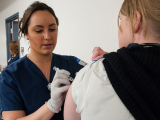In an emotional vote today sure to shake-up flu immunization plans for the upcoming flu season, federal vaccine advisors recommended against using the nasal spray vaccine, made by AstraZeneca's MedImmune and sold as FluMist, because of problems with vaccine effectiveness over the past three flu seasons.
The vote marks a dramatic turnaround for a version of the vaccine for which health officials have had high hopes. In 2014, the Advisory Committee on Immunization Practices (ACIP), a group of outside experts that helps guide Centers for Disease Control and Prevention (CDC) vaccine policy, made a preferential recommendation for nasal spray version, also called the live attenuated influenza vaccine (LAIV), because it seemed to provide better protection.
ACIP reversed itself, however, in 2015 because of disappointing performance against the 2009 H1N1 virus. As with other vaccines, LAIV also didn't work well during the 2014-15 season against a drifted H3N2 strain.
Clear scientific evidence
Though the measure passed overwhelmingly with 13 for, 1 abstention, and 1 against, many ACIP members had reservations about their votes. During today's meeting, several experts raised concerns about how the vote would affect the upcoming season's immunization programs and the challenges explaining the new recommendation to the public.
After the vote, ACIP chair Nancy Bennett, MD, said, "This is a very sad day for the influenza world." Bennett is professor of medicine and public health sciences at the University of Rochester School of Medicine and Dentistry.
Members were swayed, though, by scientific findings showing low effectiveness over the past three seasons and opted not to adopt wording that would have allowed for use of LAIV if the injectable version wasn't available. They also thought that public health messaging, while still difficult, would be simpler with the more definitive recommendation.
Before the vote, Carol Baker, MD, former ACIP chair who was at today's meeting representing the Infectious Disease Society of America, said. "One thing I've learned about flu is it changes all the time. The science makes this actionable. I don't think it's a choice." Baker is a pediatrics professor and virologist at Baylor College of Medicine in Houston.
The vote against LAIV has the support of the American Academy of Pediatrics and the Pediatric Infectious Diseases Society.
During meeting presentations, experts said producers expect to make 171 million to 176 million doses of flu vaccine for the upcoming flu season, of which about 14 million doses (8%) are LAIV. Many providers have already ordered vaccine, leaving some scrambling to replace the inhaled doses they ordered, and the lack of inhaled vaccine will likely affect school-based flu vaccine programs, which reach 5% of schoolkids. LAIV accounts for about 55% of vaccine used in school-based programs.
Actions on meningococcal, cholera vaccines
Earlier today ACIP approved a routine meningococcal vaccine recommendation for people infected with HIV and recommended cholera vaccine for US travelers who will be visiting cholera outbreak countries.
Ian Branam, a public affairs specialist with the CDC's National Center for Immunization and Respiratory Diseases, said ACIP's recommendation applies to those infected with HIV who are age 2 months or older.
Invasive meningococcal disease has a high fatality rate in people living with HIV, and today's ACIP action pertains to the meningococcal conjugate vaccine (MenACWY).
The group's recommendation for the cholera vaccine comes on the heels of the Food and Drug Administration's Jun 10 approval of the Vaxchora, the first cholera vaccine available to US travelers.
Vaxchora, produced by PaxVax, is approved for adults 64 and younger who plan to travel to cholera-affected areas. It is given as a single dose and targets Vibrio cholerae serogroup O1. Brittany Behm, MPH, public affairs specialist with the CDC's Division of Foodborne, Waterborne, and Environmental Diseases, said the decision to receive the vaccine is between the clinician and the traveler, based on travel plans and risk factors. She added that no countries currently require cholera vaccine as a condition for entry.
ACIP members meet tomorrow for a second of 2 days. No votes are planned, but the group will discuss respiratory syncytial virus in older adults; safety of maternal tetanus, diphtheria, acellular pertussis (Tdap) vaccine; lab containment of poliovirus type 2; and human papillomavirus (HPV) vaccines. ACIP meeting webcasts are available on the CDC's Web site.
See also:
Feb 26, 2015, CIDRAP news story "ACIP drops preference for nasal-spray flu vaccine in kids"
Jun 22-23 ACIP meeting agenda




















